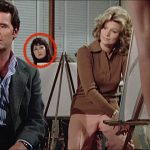Star Trek is still going strong after all of these years. Six decades since Star Trek: The Original Series first premiered in 1966. The franchise is undeniably thriving more than when it first came on the scene. There have been 7 canonical series spawned from the original series, including the; Star Trek: Discovery and Star Trek: Picard. The franchise is satisfying the appetite of the dedicated fan base that amassed in the wake of the original series. The show’s lore explores its universe in ways that we never expected – or thought possible.
Star Trek: The Original Series was the brainchild of Gene Roddenberry – who incidentally also played a key role with the spin-off series Star Trek: The Next Generation.
The show’s 3 seasons, it followed the voyages and adventures of the Starship USS Enterprise. The capable and cunning crew members onboard. Their stated aim, as the intro always reminded us was to “explore strange new worlds. It is to seek out new life, and new civilizations, to boldly go where no man has gone before.”
And that noble goal was not only pulled off by the fictional crew of the Enterprise. But the show itself definitely ‘boldly’ took audiences where they had never gone before. While there had been science-fiction TV shows before, Star Trek captured our imaginations. They took us to distant lands in a way that we had yet to experience.
Not Enough Star Trek
Since then, viewers haven’t been able to get enough of Star Trek. In addition to the 7 spin-offs, there are also 2 animated series, a film franchise, novels, and an endless stream of toys, merchandise, games, lunch boxes, apparel, and even trading card games that immerse us into its incomparable realm.
But with all of that hullabaloo that The Original Series ended up inspiring. It makes you wonder why the series was canceled after only 3 short seasons. Crazy to think that a show that had such a monumental impact on the world. It gave birth to such a die-hard cult-like following [i.e. the Trekkies) would be cut so short.
We’re going to find out the true story of why Star Trek: The Original Series was canceled after season 3. You’re going to be absolutely shocked why it had such a short run. And along the way, we’re going to dive into some of the little-known facts about Star Trek that you probably never knew. So stick around for the whole video unless you want to miss something big.
Facts Verse Presents: Why Star Trek: The Original Series Got Canceled
Before we get started, do us a favor and give us a like. Subscribe to our channel and tap on the bell icon to turn on notifications so you never have to miss another one of our facts-filled fascinating videos.
Star Trek’s Debut
This is probably going to blow your mind a bit. Especially if you’re a fan of all things Star Trek. But when it first debuted, it was met with only mixed to modest ratings. Even though there was nothing on television at the time that dealt with social and political issues the same way that Star Trek could or how they managed to seamlessly layout these themes in such a masterful way over the science-fiction backdrop without feeling forced or contrived, audiences still needed some convincing.
The show did well with young, highly educated folks but it still kept coming up in third place in its time slot. That doesn’t sound awful until you realize that there were only 3 major broadcasting networks at the time. So third place meant last, and that was something that didn’t impress any network execs.
Season Two Was Saved By Fan Support
This pattern of underwhelming Nielsen ratings and exceptionally low viewership continued on into season 2, despite the fact that a dedicated fan base was growing in the undercurrents. The series almost saw the chopping block after season two but the cult following of fans came to the rescue.
Season three would have never seen the light of day if it weren’t for a huge letter-writing campaign from fans of the show that couldn’t bear to see it go. Producers agreed to keep the show going for another season and even had plans to switch up its time slot from Fridays to Mondays hoping it would draw in a larger audience.
Hey, by the way, did you ever get around to liking this video and subscribing to our channel?
Anyways,
The Beginning of the End and the Death Slot
Unfortunately, this plan was doomed from the start. You see, Rowan & Martin’s Laugh-In, a superbly popular sketch comedy show, had already been given the Monday night spot in their contractual agreement so Star Trek was forced back into the 10 pm Friday night time slot.
This time slot means dismal things for any show unfortunate enough to occupy it. It’s quite unaffectionately referred to at times as the “death slot”, graveyard slot, or the slot where shows go to die.
Many shows have gotten the ax after being moved to this time including Highway to Heaven, Unsolved Mysteries, Firefly, and Knight Rider. Pretty much, if your show gets moved to this slot, then you might as well start to make other plans because the Grim Reaper is knocking at the door.
Nearing the Ill-Fated Finish Line
Gene Roddenberry was left feeling cheated by NBC and severely disgruntled for not being able to get Star Trek into a more favorable time slot. He was also exhausted from his relentless hard work on the first two seasons.
Because of these setbacks and his waning passion to take on an active part with his show, he took a diminished role in the third season’s production. He opted to pass the brunt of production over to Fred Freiberger who had previously worked on The Beast from 20,000 Fathoms – a grindhouse monster film from Warner Bros in the early 1950s.
Freiberger was then faced with a major obstacle to overcome. NBC knew that Star Trek wasn’t going to make it for another season so they severely slashed the show’s budget.
Between this major blow, the god-awful time-slot, and the lackluster writing talent that remained after the first two seasons; all signs pointed to season three being a disastrous farewell.
Trekkies unanimously agree that season three was the worse of the short-lived series. NBC agreed with those sentiments when they unceremoniously gave the show the boot at the conclusion of the season.
The Voyage Continued
As we all know, the cancellation of the original series didn’t spell the end of the iconic franchise. In fact, the journey was just beginning.
Star Trek immediately entered into syndication following its cancellation. Many fans got their first taste of the franchise during this period. And as more and more folks were exposed to the series, the fandom steadily began to build.
It’s not common but it’s certainly not unheard of for canceled shows to become popular posthumously. Come to think of it, The Munsters The Odd Couple, The Brady Bunch and Leave it to Beaver all enjoyed larger audiences once they had already been cut and sent into syndication as well.
Seeing the increase in popularity, NBC first greenlit an animated series that pretty much served as a stand-in for the original series’ hypothetical fourth and fifth seasons. That series ran from 1973 to 1974 and Roddenberry played a major role in its production – despite the fact that the show would later become de-canonized after The Next Generation went into production.
Thriving Film Franchise
Following the animated series brief tenure, the network planned a reboot called Star Trek: Phase II for the late 1970s, but following the behemoth of a success story that Star Wars became following its release in 1977, that project was scrapped and eventually evolved into Star Trek: The Motion Picture.
In case you’ve never seen it, you’ve seriously got to check it out. Star Trek: The Motion Picture was a huge financial success. It grossed $139,000,000 worldwide. Adjusted for inflation, that’s about 500 million dollars! It also was nominated for 3 Academy awards.
Following its box office success, Star Trek became a thriving film franchise. 6 films were made in total drawing upon the cast of characters and plotline debuted in the original series. Then in September of 1987 something happened that solidified the fact that Star Trek had not faced its final frontier.
Star Trek: The Next Generation was what every fan could hope for. It had Gene Roddenberry at the helm once again and followed the adventures of the USS Enterprise in its exploration of the Milky Way a century after the events of the original series. The cast was superb and the writing was impeccable.
NBC’s Worse Move Outshined By A Lasting Legacy
Many cite NBC’s move to cancel Star Trek: The Original Series as being one of the most puzzling and ill-advised moves in television history. It’s clear however that Gene Roddenberry’s magnum opus didn’t get snuffed out by the cancellation of its freshman offering.
Star Trek fans are the ones we should all give thanks to. They were the ones that believed in Gene’s vision and gave life to the collection of ideas and characters that remain a touchstone of American culture and a triumphant Crème de la crème of science fiction. Trekkies, in fact, saved Star Trek from an untimely demise.
The franchise continued and gave birth to many more incarnations, series, and spin-offs. From Voyager to Deep Space Nine to the film series directed by J.J. Abrams, the Star Trek Legacy continued on in its pursuit to boldly go where no one had gone before. And boy, what a journey that has been.
Well, here we are again at the end of another facts-forward video. Hopefully, we paid tribute to the enduring heritage that is connected to the Star Trek franchise. Gene Roddenberry’s creation spiked the imagination of young dreamers and has piqued our interest for 6 decades because there was a spark of something supremely special in his vision.
Now it’s time to hear from you. Between Star Trek: The Original Series and The Next Generation, what do you think was the most influential series. Let us know what you think in the comments section.
And before you go, make sure to give us a like and subscribe to our channel. It only takes a moment and it’s the best way for you to show us some support.


